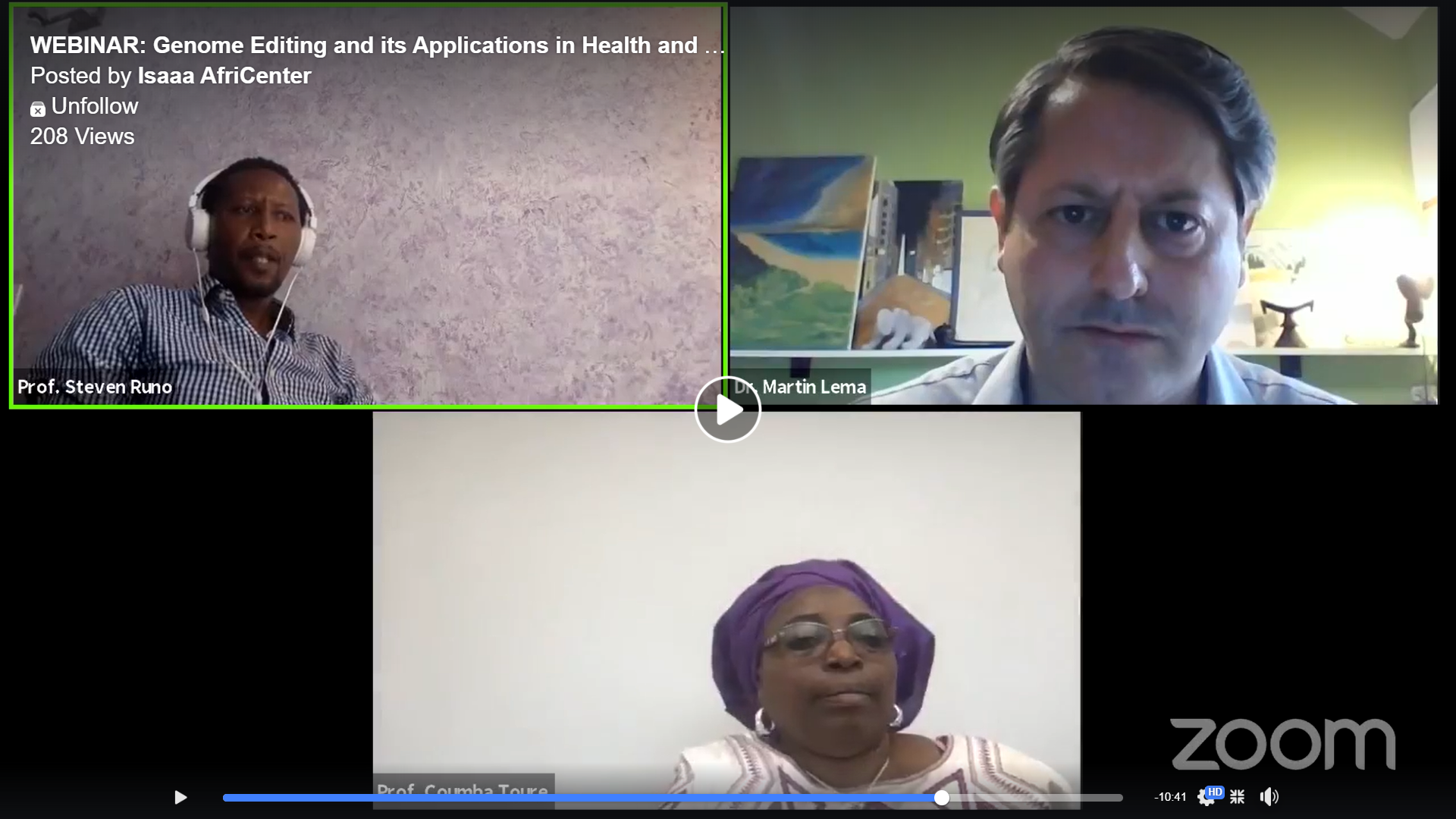
Experts Urge States to Embrace Genome Editing in Addressing Key Challenges in Health and Agriculture
June 10, 2020| |
Genetics and health experts have endorsed genome editing as among the most transformative technologies of the 21st century with a huge potential to provide solutions to complex challenges in health and agriculture. In a webinar organized by ISAAA AfriCenter on World Environment Day, June 5, 2020, experts from Kenya, Senegal, and Argentina explained the applications of genome editing in health and agriculture.
Genome editing provides advanced biotechnological techniques that enable precise and efficient targeted modification of an organism's genome. This technology presents the scientific community with tools at a relatively low cost for innovation in medicine, agriculture, environment, and industrial biotechnology. The progressive technology also holds immense potential in contributing to building a sustainable bioeconomy.
Experimentally tested between 2005 and 2009, CRISPR-Cas9 genome editing has enabled scientists to make changes to DNA, making distinct changes to target traits. "In crop breeding, genome editing presents breeders with enhanced speed, precision, and efficiency to develop adaptable varieties suited for modern agriculture," stated Steven Runo, Professor of Molecular Biology and Biotechnology at Kenyatta University, Kenya. "The technology is also being explored in developing gene therapies to prevent and treat diseases in humans," added Coumba Toure, Professor of Microbiology at Cheikh Anta Diop University in Senegal.
In Argentina, advances in genome editing research promise to improve both crop and animal productivity. "By improving agricultural and consumer interest traits in major food crops, genome editing will contribute to national food security and economic growth," emphasized Martin Lema, Professor of Biotechnology and Biosafety at National University of Quilmes, Argentina.
The webinar attended by 266 individuals from 64 countries closed with recommendations to promoting science, technology, and innovations in addressing intractable societal challenges. The introductory Genome Editing 101 forum will be followed by a series of webinars exploring various aspects of genome editing including applications in industrial production and environmental conservation, policy and regulations, socio-economic impact, and building thriving bioeconomies.
To register for the next webinar, look out for the call on ISAAA AfriCenter's Facebook and Twitter pages.
For more information on ISAAA's Genome Editing webinars, contact Dr. Margaret Karembu at mkarembu@isaaa.org.
| |
You might also like:
- Gene Editing Used to Develop Vitamin A-fortified Rice
- Tungro-Resistant Rice Developed through CRISPR-Cas9
- Plant Breeding Innovation: CRISPR-Cas9
Biotech Updates is a weekly newsletter of ISAAA, a not-for-profit organization. It is distributed for free to over 22,000 subscribers worldwide to inform them about the key developments in biosciences, especially in biotechnology. Your support will help us in our mission to feed the world with knowledge. You can help by donating as little as $10.
-
See more articles:
-
News from Around the World
- Study Highlights The Role of Communication in Novel Food Acceptance
- COVID-19 Driving Up Hunger in Food Crisis Hotspots, Urgent Action Necessary
- Top 5 Biotech Crops Occupy 99% of Global Biotech Crop Area
- Experts Urge States to Embrace Genome Editing in Addressing Key Challenges in Health and Agriculture
- International Research Team Document First Use of Maize in Mesoamerica
- Farmers in Paraguay Achieve Yield Increases through Agri-biotech
-
Plant
- USDA Classifies Gene-Edited Soybean As Non-Regulated
- Experts Use Viruses for Transgene-free Gene Editing in Plants
-
Health
- CRISPR Technique 90% Effective in Reducing SARS-CoV-2 Coronavirus
- Study Shows COVID-19 Risk Might be Linked to Blood Type
-
Read the latest: - Biotech Updates (January 28, 2026)
- Gene Editing Supplement (January 28, 2026)
- Gene Drive Supplement (February 22, 2023)
-
Subscribe to BU: - Share
- Tweet

